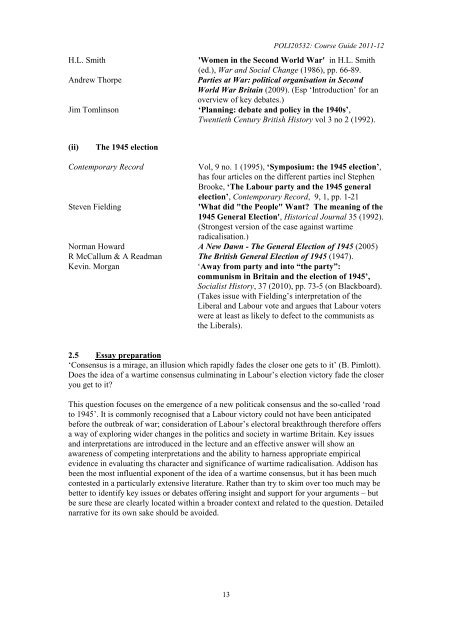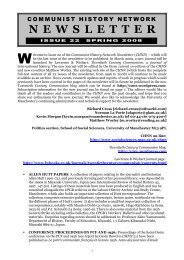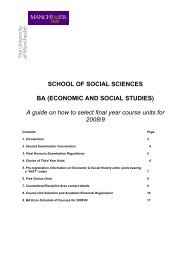POLI20532 Course Outline 1112 - School of Social Sciences
POLI20532 Course Outline 1112 - School of Social Sciences
POLI20532 Course Outline 1112 - School of Social Sciences
Create successful ePaper yourself
Turn your PDF publications into a flip-book with our unique Google optimized e-Paper software.
H.L. Smith<br />
Andrew Thorpe<br />
Jim Tomlinson<br />
<strong>POLI20532</strong>: <strong>Course</strong> Guide 2011-12<br />
'Women in the Second World War' in H.L. Smith<br />
(ed.), War and <strong>Social</strong> Change (1986), pp. 66-89.<br />
Parties at War: political organisation in Second<br />
World War Britain (2009). (Esp ‘Introduction’ for an<br />
overview <strong>of</strong> key debates.)<br />
‘Planning: debate and policy in the 1940s’,<br />
Twentieth Century British History vol 3 no 2 (1992).<br />
(ii)<br />
The 1945 election<br />
Contemporary Record<br />
Vol, 9 no. 1 (1995), ‘Symposium: the 1945 election’,<br />
has four articles on the different parties incl Stephen<br />
Brooke, ‘The Labour party and the 1945 general<br />
election’, Contemporary Record, 9, 1, pp. 1-21<br />
Steven Fielding<br />
'What did "the People" Want? The meaning <strong>of</strong> the<br />
1945 General Election', Historical Journal 35 (1992).<br />
(Strongest version <strong>of</strong> the case against wartime<br />
radicalisation.)<br />
Norman Howard A New Dawn - The General Election <strong>of</strong> 1945 (2005)<br />
R McCallum & A Readman The British General Election <strong>of</strong> 1945 (1947).<br />
Kevin. Morgan<br />
‘Away from party and into “the party”:<br />
communism in Britain and the election <strong>of</strong> 1945’,<br />
<strong>Social</strong>ist History, 37 (2010), pp. 73-5 (on Blackboard).<br />
(Takes issue with Fielding’s interpretation <strong>of</strong> the<br />
Liberal and Labour vote and argues that Labour voters<br />
were at least as likely to defect to the communists as<br />
the Liberals).<br />
2.5 Essay preparation<br />
‘Consensus is a mirage, an illusion which rapidly fades the closer one gets to it’ (B. Pimlott).<br />
Does the idea <strong>of</strong> a wartime consensus culminating in Labour’s election victory fade the closer<br />
you get to it?<br />
This question focuses on the emergence <strong>of</strong> a new politicak consensus and the so-called ‘road<br />
to 1945’. It is commonly recognised that a Labour victory could not have been anticipated<br />
before the outbreak <strong>of</strong> war; consideration <strong>of</strong> Labour’s electoral breakthrough therefore <strong>of</strong>fers<br />
a way <strong>of</strong> exploring wider changes in the politics and society in wartime Britain. Key issues<br />
and interpretations are introduced in the lecture and an effective answer will show an<br />
awareness <strong>of</strong> competing interpretations and the ability to harness appropriate empirical<br />
evidence in evaluating ths character and significance <strong>of</strong> wartime radicalisation. Addison has<br />
been the most influential exponent <strong>of</strong> the idea <strong>of</strong> a wartime consensus, but it has been much<br />
contested in a particularly extensive literature. Rather than try to skim over too much may be<br />
better to identify key issues or debates <strong>of</strong>fering insight and support for your arguments – but<br />
be sure these are clearly located within a broader context and related to the question. Detailed<br />
narrative for its own sake should be avoided.<br />
13
















